Survey Report
As 2014 draws to a close, the public is deeply pessimistic about the prospects for healing the nation’s deep political divisions. And most Americans think continued partisan gridlock would wreak significant damage on the country.
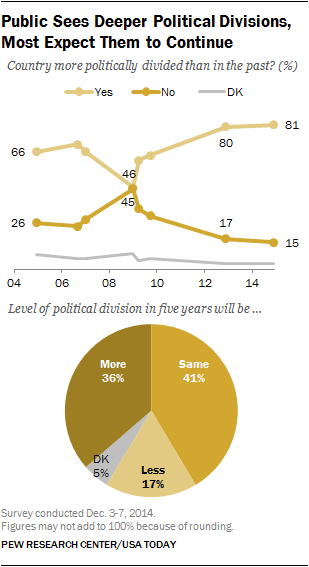
To start, perceptions of the current level of political division continue at record levels: 81% say the country is more politically divided these days than in the past. While that is little changed from two years ago, it is as high a percentage expressing this view as at any point over the past decade.
Looking ahead, few Americans expect the nation’s political differences to diminish. Just 17% think the country will be less politically divided five years from now. More than three-quarters (78%) say either the country will be as about divided as is today (41%), or more politically divided (36%).
A skeptical public does not expect much cooperation from either Barack Obama or Republicans in Congress over the next two years: 44% expect Barack Obama to cooperate with GOP leaders either a great deal or fair amount. Even fewer (28%) expect Congressional Republicans to cooperate with Obama. A November Pew Research Center survey found that this may be just fine with some partisans, many of whom expressed a desire for their side to stand up to their political opponents on issues, rather than work together and accept some concessions.
After Democrats won control of Congress in 2006, 48% said Democratic leaders would cooperate at least a fair amount with former President George W. Bush – 20 points higher than the share saying that about Republicans today. And 52% expected Bush to cooperate with the Democrats.
The latest national survey by the Pew Research Center and USA TODAY, conducted Dec. 3-7 among 1,507 adults, finds that the costs and consequences of partisan gridlock are hitting home for many Americans.
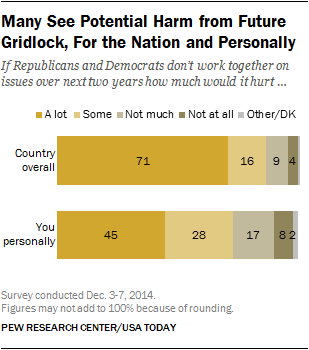
Fully 71% say a failure of Republicans and Democrats to work together over the next two years would hurt the nation “a lot” and 16% say it will hurt “some.” While the negative impact of political gridlock is seen as being most acute for the country as a whole, 45% say they would be hurt a lot personally by an absence of partisan cooperation, and 28% would be hurt some. Notably, there are only minimal partisan differences in these opinions.
The public’s unhappiness with Washington also is reflected in their views of the most important problems facing the nation. Despite signs of an improving economy, about a third (34%) cite an economic issue as the top national problem. But just half as many specifically cite unemployment or joblessness as did so at the start of the year (20% then, 10% now). Meanwhile, the share expressing dissatisfaction with government or the president, or who cite partisan gridlock or the divisions in the country has increased from 13% last January to 18% currently.
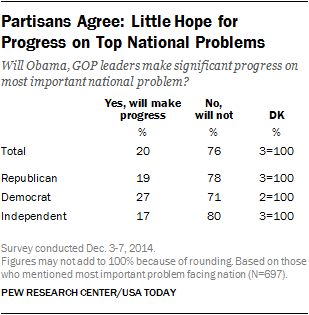
Irrespective of the top issue they see facing the nation, few expect Obama and GOP leaders to make progress on that problem. About three-quarters (76%) of those who cited a top national problem – including large majorities of Republicans (78%), Democrats (71%) and independents (80%), say they do not think Obama and Republican leaders will make progress on the problem they mentioned.
The survey finds there has been virtually no change in Obama’s job ratings over the past year. Currently, 42% approve of the way he is handling his job as president, while 51% disapprove. Obama’s job ratings have not varied by more than two points since January.

Obama’s job rating for handling the economy has risen six points – from 39% to 45% – since August. At the same time, the 45% who approve of the way he is handling the threat of terrorism is the lowest mark of his presidency on this issue.
Weeks before the start of the new Congress, the public takes a dim view of Congress and both political parties. Just 22% express a favorable opinion of Congress; positive views of Congress have remained below 30% for more than three years.
There is no sign of a honeymoon for the Republican Party following its midterm victories: Just 37% view the GOP favorably while 57% view it unfavorably, little changed over the past year.
What has changed is the Democratic Party’s favorable ratings, which are now nearly as low as the GOP’s. Just 41% have a favorable impression of the Democratic Party while 54% have an unfavorable opinion. That is among the most negative measures of favorability for the Democrats in more than two decades of polling.
Public’s Not-So-Happy New Year
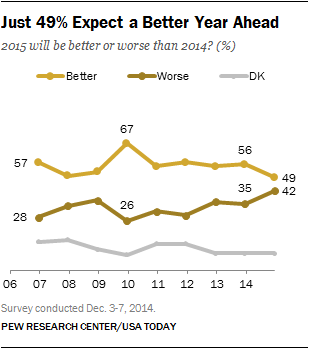
The public remains deeply dissatisfied with the way things are going in the country. Just 26% are satisfied with national conditions, while 71% are dissatisfied. And it has muted expectations for the year to come: 49% say they think 2015 will be a better year than 2014, while 42% think it will be worse. The current ratings are more pessimistic than in recent years, as the public generally takes an optimistic view of the year to come.
A year ago, 56% thought 2014 would be a better year than the last, compared with fewer (35%) who thought it would be worse. The current seven-point gap in expectations for a better (49%) than worse (42%) year is the narrowest margin measured in Pew Research Center surveys dating to 1994.
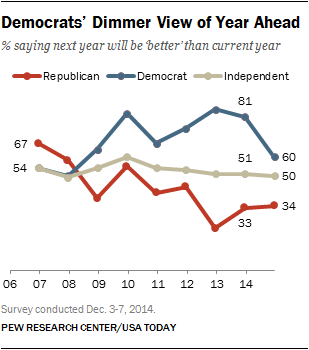
The more negative expectations for 2015 are driven in large part by a shift in views among Democrats. A month after the Republican Party gained full control of Congress, 60% of Democrats expect 2015 to be better than 2014. That is down 21 points from a year ago when 81% thought 2014 would be better than 2013.
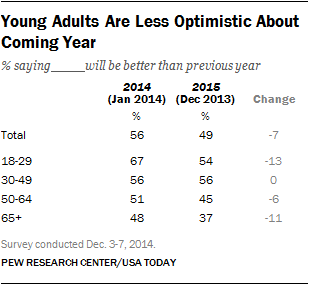
Nonetheless, views among Democrats are brighter than those of Republicans: just 34% of Republicans expect the coming year to be better than the last, little changed from prospective views of 2014 (33% better). In December 2012, following Barack Obama’s reelection, just 22% of Republicans thought 2013 would be a better year than 2012.
Across age groups, young adults under age 30 are less optimistic about 2015 than they were about 2014. Overall, 54% think 2015 will be better than 2014, compared with two-thirds (67%) who thought 2014 would be better than 2013. Those under 30 are often the most optimistic age group about the coming year. However, in the current survey they are no more likely to say 2015 will be better than 2014 than are those ages 30-49 (56%).
Republicans Don’t Expect Obama to Cooperate with GOP Leaders
The public’s expectations for cooperation between leaders in Washington are highly partisan. Fully 66% of Democrats think Obama will cooperate at least a fair amount with Republican leaders in Congress over the next two years, compared with just 19% of Republicans who say this.
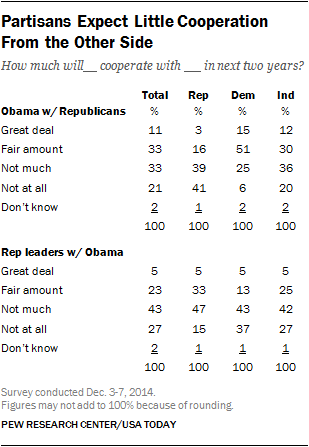
When it comes to Republicans leaders in Congress, Democrats are skeptical that they will cooperate with Obama: just 18% say they expect this to happen. Republicans don’t expect their party’s congressional leaders to cooperate with Obama either: Just 37% say this compared with 62% who expect them to cooperate not much or not at all with the president.
In part, low expectations for GOP cooperation among rank-and-file Republicans may reflect the fact that 66% of Republicans and Republican-leaning independents want their leaders to stand up to Obama on issues, even if less gets done, rather than work with him, if it means disappointing some groups of Republican supporters. (For more see: “Little Enthusiasm, Familiar Divisions After the GOP’s Big Midterm Victory,” released Nov. 12, 2014).
Expectations for compromise between the GOP-led Congress and Obama are lower than they were eight years ago, following the Democratic Party winning control of Congress during George W. Bush’s second term.
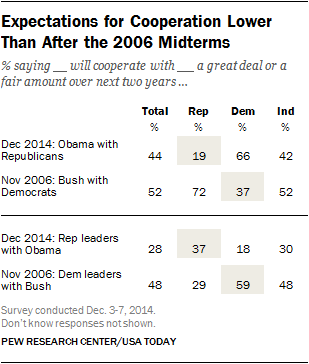
In November 2006, about half of the public (48%) expected Democratic leaders to cooperate with Bush, including 59% of Democrats. Today, just 28% expect cooperation from Republican leaders, driven in part by relatively low expectations for compromise among Republicans (37%).
Eight years ago, 52% expected Bush to cooperate with Democratic leaders in Congress over the final two years of his presidency, slightly more than the 44% who expect Obama to cooperate with GOP leaders today. In the current survey, Republicans (19%) are much more skeptical about Obama cooperating with GOP leaders than Democrats (37%) were about Bush cooperating with Democratic leaders in November of 2006.
Most Important Problem Facing the Nation
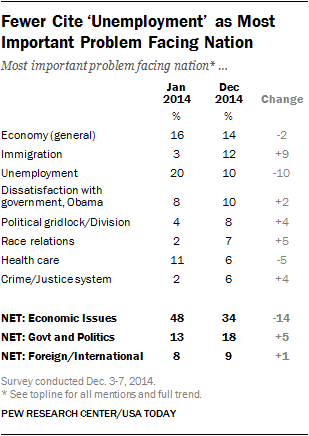
The share of Americans citing economic issues as the most important problem facing the nation has declined significantly over the course of 2014. In the current survey, 34% say economic issues are the country’s top problem, down from 48% in January of this year.
And as the national unemployment rate has moved lower, the percentage specifically mentioning ‘unemployment’ as the most important problem facing the nation has declined ten points from 20% to 10%.
Nonetheless, more continue to cite economic issues as the biggest problem facing the country than any other set of issues. Overall, 18% mention dissatisfaction with government, Obama, partisanship or gridlock as the country’s top problem, up slightly from 13% earlier this year.
Despite the emergence of the terrorist group known as ISIS – and the U.S.-led military campaign against the group – just 9% say foreign or international issues are the country’s top problem, unchanged from January.
Stable Views of Obama
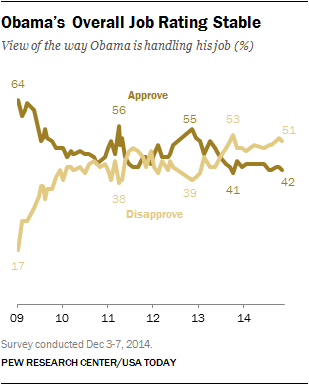
Today, 42% say they approve of the way Barack Obama is handling his job as president, while 51% disapprove. These ratings are little changed over the past year.
Nearly nine-in-ten Republicans (89%) disapprove of Obama’s performance, while views among independents are also more negative than positive (55% disapprove, 39% approve). Obama continues to receive positive ratings from a majority of Democrats (72% approve, 19% disapprove).
Obama’s handling of the economy is currently one of his better ratings: 45% currently approve, up six points (from 39%) in August.
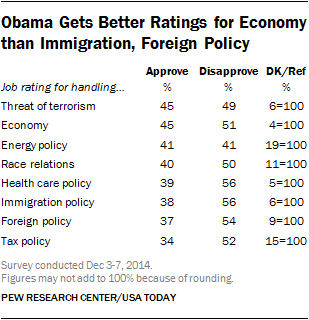
While as many (45%) approve of Obama’s handling of the threat of terrorism, this is his lowest ever rating on this issue: As recently as June 2013 a majority of Americans (56%) approved of his handling of terrorist threats.
Tax policy (34% approve) and foreign policy (37%) are among Obama’s worst-performing issues. And while just 38% approve of Obama’s handling of immigration policy, this reflects an improvement from August of this year when just 31% approved of his handling of immigration (See the separate report on immigration policy released today for more details.)
Perceptions of Democratic Party Grow More Negative
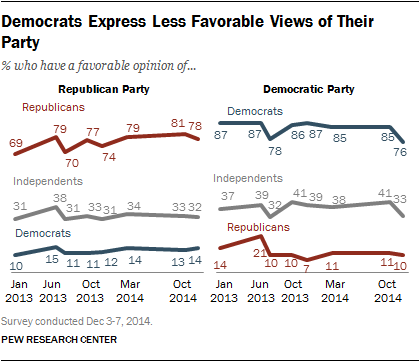
Following the Democratic Party’s losses in the 2014 elections, views of the Democratic Party have taken a hit: Just 41% of Americans have a favorable impression of the party, down from 47% in October—and among the lowest ratings ever for the Democrats.
Though views of the Democratic Party have grown more negative, there is no sign that views of the GOP have improved: Only 37% say they have a favorable view of the Republican Party, a rating that is unchanged over the course of the last year.
Though about three-quarters of both Democrats (76%) and Republicans (78%) view their own party favorably, Democratic ratings of their own party have become less positive in the last few months (in October, 85% of Democrats had a favorable view of their own party). And today independents’ views of the two parties are about the same. About a third have favorable impressions of either the Republican Party (32%) or the Democratic Party (33%); in October, more independents viewed the Democratic Party (41%) positively than the Republican Party (33%).
Congressional Favorability Remains Near Record Lows
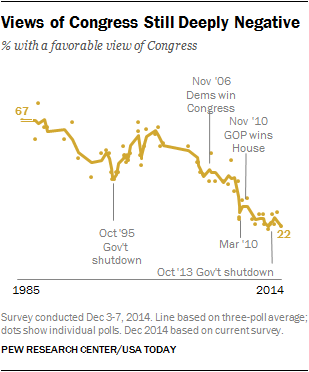
As has been the case for the last several years, Americans view Congress negatively: Just 22% now express a favorable opinion of the institution while 71% say their opinion is unfavorable. The current ratings rival the lowest on record (in July 2013, 21% had a favorable opinion, 70% an unfavorable one); and are down six points since July of this year, though they are on-par with ratings in February.
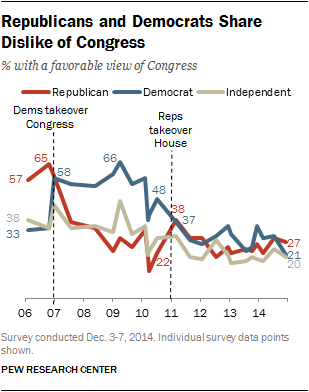
Though negative ratings of Congress cross party lines, Democratic impressions have become more negative over the last several months; today 21% of Democrats view Congress favorably, down from 30% in July.
And as Republicans are poised to take control of both houses of Congress in January, their views of the institution are little changed over the past few years; currently 27% say they have a favorable view.
Independents’ views of Congress remain deeply negative; just 20% have a positive impression of Congress.
Negative Ratings for Republican and Democratic Leaders
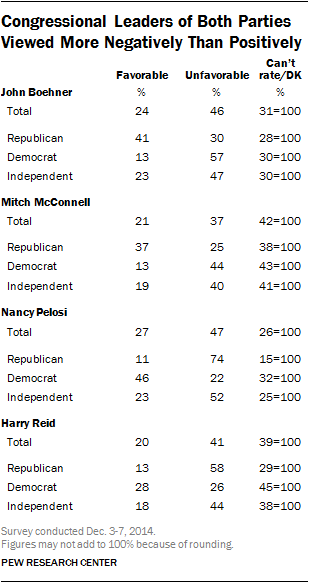
Public views of congressional leaders—on both sides of the aisle—continue to be more negative than positive. By wide margins, more have unfavorable than favorable impressions of House Speaker John Boehner (46% unfavorable, 24% favorable), incoming Senate majority (and current minority) leader Mitch McConnell (37% vs. 21%), House minority leader Nancy Pelosi (47% vs. 27%) and outgoing Senate majority leader Harry Reid (41% vs. 20%).
Overall, these ratings are little changed from before the midterm election. However, favorable views of Harry Reid in the wake Democrats losing control of the Senate are lower than they were in October 2013. At that time, 27% had a favorable opinion of him, while 39% viewed him unfavorably.
In particular, views of Reid have become more negative among Democrats. Nearly half of Democrats (47%) had a positive impression of him in October 2013, while just 18% viewed him unfavorably; today, Democratic opinions of Reid are about evenly divided (28% favorable, 26% unfavorable).
The three other leaders continue to be viewed more positively than negatively by those in their own party, while opinions of those in the opposing party are largely negative.
Members of the congressional leadership are not well-known by the public. In particular, as Mitch McConnell prepares to become majority leader of the Senate, fully 42% of Americans do not know enough about him to rate him (including 24% who have never heard of the Kentucky senator). Notably, Nancy Pelosi continues to be a more visible figure than the other leaders – just 26% fail to offer an opinion of Pelosi.
Michelle Obama Remains Popular
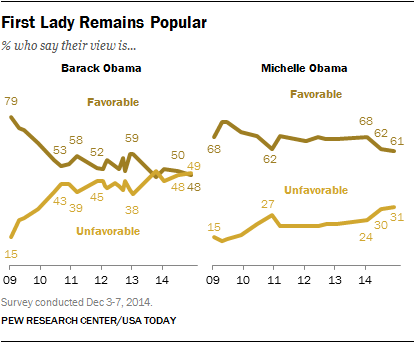
Overall, nearly half of Americans (48%) have a favorable view of Barack Obama, while about as many (49%) say their opinion of the president is unfavorable.
The first lady’s public image is more positive: 61% have a favorable opinion of Michelle Obama, while just 31% say their opinion is unfavorable.
Public views of both the president and first lady are little changed since July.